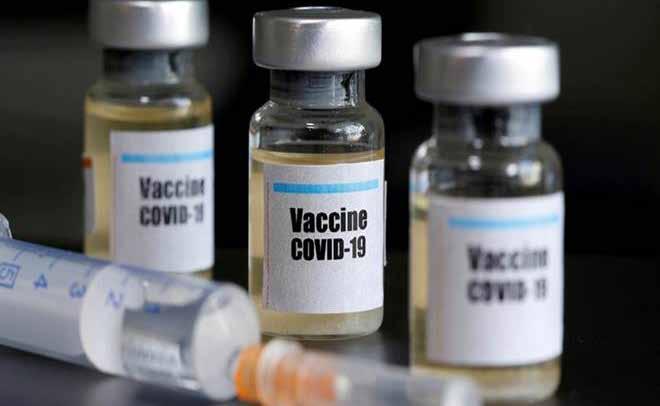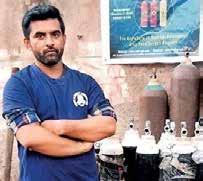
18 minute read
City Image
Innovat
Carrying a mask and hand sanitiser has become a new normal of our lives today. At times, we forget to carry. And, if you are in Jharkhand, you are in big trouble. You could be fined Rs One lakh for not wearing
Advertisement
on for C t zens
a mask. Poland has shown a way to municipalities for easing people’s lives. With scientists and businesses coming out with innovations to battle COVID-19 and ease citizens’ lives, municipalities in Poland have
installed mask and hand sanitiser vending machines ‘Maseczkomat’. The vending machines enable citizens to get a cashless opportunity to purchase protective masks, gloves and hand sanitiser.
Delhi gets first mobile COVID-19 testing lab
Union Ministry of Health and Family Welfare launched its first mobile testing van in New Delhi. The mobile lab was inaugurated by Dr Harshvardhan, Union Minister of Health, and has testing capacity of running 50 Covid tests simultaneously. The Ministry of Science and Technology’s Department of Biotechnology, in collaboration with MedTech Zone, Andhra Pradesh, developed the infectious disease diagnostic lab. The unit can be used to diagnose other diseases as well and will be used post- Corona as well. The government is planning to develop 50 more such mobile labs in a bid to eradicate diseases by timely identification in remote rural areas of the country.
57 girls in Kanpur shelter home test COVID positive
Multiple cases, as many as 57 cases, of COVID-19 infections in girls at a child shelter home in Kanpur district of Uttar Pradesh have been reported as of June 21. Brahma Dev Ram Tiwari, District Magistrate, Kanpur, said that the Child Welfare Committees of Agra, Etah, Kannauj, Firozabad and Kanpur, under the POCSO Act, had referred the 5 girls. Along with the 57 girls, one employee has also been found coronapositive. The first case came on June 15, following which immediate necessary action was not undertaken by the district administration. 33 cases in the same home were registered on June 17.
500 railway coaches for Delhi to increase COVID-bed strength
NEW DELHI: Given the rapid growth of corona positive cases in Delhi, the Centre has agreed to provide 500 railway coaches to the city to bridge the shortage of beds for quarantining patients of the city. Amit Shah, Union Home Minister, announced the Centre’s decision after his meeting with Arvind Kejriwal, Chief Minister, Delhi, on June 14.
The move will add 8,000 more beds to the existing strength of beds in Delhi, while also increasing facilities and equipment to treat the infection simultaneously. Delhi has a total bed capacity of 9,698 out of which 4,248 are vacant at present, Delhi’s coronavirus app says. Even as the cases continue to mount, authorities expect worse, as Manish Sisodia recently announced that the capital alone is likely to witness over 5 lakh cases of the virus in the near future. In order to incorporate the expected

increase in cases, Delhi Government is also planning to use over 40 hotels and 77 banquet halls as makeshift hospitals.
Dr Harsh Vardhan, Union Health Minister, and Anil Baijal, Lieutenant Governor, Delhi, also attended the meeting. Officials of State Management Authority were also present.
As the cases continuously ramp up in the city, Vijay Dev, Chief Secretary, Delhi, announced that testing facilities are to be ramped up to 10,000 and would also ensure 100 per cent testing in the containment zones.
Rajasthan offers Covid-19 testing facilities to neighbouring states
JAIPUR: While Covid -19 cases are increasing drastically in neighbouring states, Rajasthan has offered testing facilities of upto 5,000 samples daily to neighbouring states. During a meeting to review the pandemic situation in the state, Ashok Gehlot, Chief Minister, Rajasthan, said that in times of crisis, states surrounding Rajasthan, which are overloaded with cases and short of testing facilities, can get tests done in Rajasthan. The state has the highest number of tests being performed daily in the country. Gehlot also announced that by July end, all government hospitals in Rajasthan will have pipeline supply of oxygen instead of a cylinder based supply. He went on to note that the state managed to go from zero tests to over 25,000 tests daily while also noting that the recovery rate in the state touched 75 per cent. He said that constant monitoring and screening of patients is responsible for the high recovery rate in the state.
Jitendra Chaudhary, head of the lab technicians association at SMS hospital, said using the CB-NAAT machines and pool testing technique has helped to ramp up testing capacity in the state. 72 CB-NAAT machines are being used for COVID testing. ICMR approved these diagnostic machines, which are used for testing TB, to be used for COVID testing. Currently, testing is being carried out in 16 districts in the state though the chief minister and health minister have said that testing facilities will soon be developed in all 33 districts.
BRIEFS | NEWSCAN
Surge in global COVID-19 cases due to simultaneous peaking: WHO
Dr Michael Ryan, Emergencies Chief, World Health Organisation (WHO) has said that the number of COVID-19 cases are rising because the pandemic is peaking simultaneously in some big and populous countries at the same time, reflecting a change in the global activity of virus. He added that the virus has established itself very well as several countries have noted increase in hospital admissions and deaths and increased testing can’t explain either of the two. The situation was “definitely accelerating” in a number of countries, including the US and others in South Asia, the Middle East and Africa, the premier health organisation said.
Unemployment back at pre-lockdown levels: CMIE
The unemployment rate in India, which shot up during the lockdown to 27.1 per cent in the week ending by May 3, has returned back to pre-lockdown levels. The rate now stands at 8.5 per cent, economic think tank Centre for Monitoring Indian Economy (CMIE) discovered. The survey conducted by CMIE has shown that the gain can be attributed to the employment boost in rural areas. Mahesh Vyas, Managing Director and CEO, CMIE, has said that bigger gains are expected to be made in the coming months in rural areas.
India, France sign 200 million euros agreement to fight coronavirus
NEW DELHI: France and India have signed an agreement under which both the countries would be committing 200 million euros in a bid to increase the state and central government’s capacities to support the most vulnerable people in the wake of the COVID-19 crisis. According to a statement by the French Embassy in India, the agreement was signed by C S Mohapatra, Additional Secretary, Department of Economic Affairs, and Bruno Bosle, Director, AFD (French Development Agency) in India, in the virtual presence of Emmanuel Lenain, Ambassador of France to India. The program design has been developed by the World Bank, in collaboration with Indian authorities, and seeks to optimize and scale up the Indian government’s existing social protection measures. The Agreement is focused on boosting the recently launched Pradhan Mantri Garib Kalyan Yojna (PMGKY) and to provide other benefits to low income families so that the health, social and economic shocks arising from COVID-19 do not endanger people’s well-being or jeopardise their contribution to the overall growth of the Indian economy in the long run. Under the programme, the government will also ensure better safety of frontline workers, particularly those working in healthcare, sanitation and security services, by providing them with a state-sponsored health insurance. Social assistance programmes will also be set up for low income urban families and migrant workers who will be unable to avail services and benefits of the PMGKY. Lanain, while recalling France’s approach to handling global catastrophes through multilateral cooperation, said that both President Emmanuel Macron and Prime Minister Narendra Modi have worked together tirelessly so that excellent relations between India and France translate into an outstanding response against COVID-19.
WHO warns COVID-19 entering ‘new & dangerous phase’
Geneva : The World Health Organization (WHO) warned that the COVID-19 pandemic is entering a new and dangerous phase as daily corona cases hit record highs. Tedros Adhanom Ghebreyesus, WHO chief, said that the cases are accelerating after the numbers of cases reported daily are breaking all previous records. He added that almost half of the cases were reported from the Americas with a large number coming from Southern Asia and the Middle East.
He also noted that people are fed up of being at home and countries want to reopen their economies, but this time calls for extreme caution as the virus is spreading fast and many are still vulnerable. WHO had previously told the world leaders that there can be no going back to usual following the COVID-19 pandemic which has brought down the economies and wreaked havoc on nearly every country across the globe. The countries need to manage around the coronavirus in the near future as the cases are declining in some countries, while rising in others and reappearing in the areas where it was previously reported to be under control. COVID-19 has shown that no one is safe until all are safe and a difference can be only made if politics is kept aside and everyone is working together. There is no vaccine for coronavirus as of now, and therefore, prevention from the disease is the only way for the entire world to stay safe, WHO said.
MoHFW issues revised guidelines for home isolation during COVID-19
NEW DELHI: Amid the COVID-19 pandemic spreading wildly in India, the Ministry of Health and Family Welfare (MoHFW), Government of India, has issued a revised set of guidelines for ‘home isolation’ for COVID-19 patients. People with mild and pre-symptomatic COVID-19 can opt for home treatment provided they are isolated in a separate room, with access to an individual toilet and an adult attendant/caregiver, said the advisory.
The patient in home isolation also has to give regular health updates to the District Surveillance Officer for further follow up by the surveillance teams. As a new and important addition to the guidelines, the doctor in-charge of the patient has to be satisfied before he/she is advised/approved to remain in home isolation, based on medical assessment of his/her residential accommodation. The patient, on the other hand, also has to sign an undertaking to remain in home isolation and follow all the rules of home quarantine.
A team of well-trained doctors will also keep the patients under surveillance regularly. Both the doctor and the patient will have to follow the required guidelines during discharge and report updates as per norms. MoHFW has asked states to keep an eye on the medical establishment and those asked to remain in home quarantine and to make sure that the norms mentioned in the revised guidelines are followed strictly.
The statement from MOHFW on the guidelines considered this to be of utmost importance in the battle against COVID-19.
Delhi to revise COV ID-19 pandemic management plan

NEW DELHI: Given the rapid increase in the number of positive cases in the National Capital, the Centre has asked the Delhi Government to redefine containment zones. The Ministry of Home Affairs (MHA) suggested changes in the state government’s approach to deal with the pandemic on the basis of a report presented by a committee led by Dr VK Paul, Member, NITI Aayog. Dr Randeep Guleria, Director, AIIMS Delhi; Dr Balram Bhargava, Director General, Indian Council of Medical Research (ICMR), were also part of the committee. The meeting was chaired by Amit Shah, Union Home Minister, and attended by Arvind Kejriwal, Chief Minister, Delhi; Manish Sisodia, Deputy CM; Anil Baijal, Lieutenant Governor of Delhi and Dr Harsh Vardhan, Union Health Minister, amongst other senior officials. The key recommendations for Delhi by the Centre were: A better containment tactic to be developed; contact tracing to be broadened; antibody testing; better utilisation of police to enforce social distancing. Moreover, it was also recommended that an epidemiologist be employed at district level to improve healthcare services. For better contact tracing, better use of Aarogya Setu and Itihas apps should be done. The recommendation also included conducting a serological survey among 20,000 people between June 27 andto June 7 . Associating each district with a specific hospital was also suggested. Further, MHA suggested that Delhi Government must also assess each death and report back on each patient’s status after being admitted into a hospital. If the deceased was earlier in home isolation, whether they were brought to the hospital in time must also be key.
IMF further contracts India’s, world’s predicted growth rate in FY21
The International Monetary Fund (IMF) has projected a deeper economic growth for both India and the world in financial year 2021 (FY21), citing longer lockdown durations and slower than anticipated economic recovery rates. In the June update of ‘A Crisis Like No Other, An Uncertain Recovery’ of its flagship World Economic Outlook (WEO), the IMF has projected a -4.5 per cent growth rate for India and a -4.9 per cent global growth rate for FY 21. The IMF further said that the Covid-19 pandemic has had a stronger-than-anticipated effect on the world economy, the real recovery rate is much slower than that anticipated.
Indian Railways cancels all regular trains till August 12
Ministry of Railways, Government of India decided to cancel all ‘regular’ trains starting July 1 till August 12. “It has been decided that regular time-tabled passenger services including Mail/Express, passenger and suburban services stand cancelled up to 12.08.2020,” the Railway Board said in a notification. All tickets booked by the public for regular timetabled trains will be cancelled and the fare will be refunded to the travelers. However, all special Rajdhani, mail and express trains that resumed operation from May 12 and June 1 will continue to operate.
BRIEFS | NEWSCAN
Delhi sets up plasma bank amidst questions on the efficacy of the treatment
The Delhi Government has set up a plasma bank at the Institute of Liver and Biliary Science. Arvind Kejriwal, Chief Minister, Delhi, while addressing an online press briefing, said that hospitals will have to approach the plasma bank to get the facility. A separate helpline would be set up to cater to the queries related to the donation of plasma. The decision was taken after the Delhi Government had conducted trials on plasma therapy and results were encouraging, Kejriwal said. However, the Centre has issued precautionary advisory over this and questioned its efficacy, which is yet to be established.
Mizoram records 80% COVID -19 recovery rate
The Mizoram Government has reported that more than 80 per cent of the total COVID-19 infected patients in the state have recovered from the deadly virus as of July 1, 2020. Of the total 151 patients so far, there are 29 active cases and 122 have been cured and discharged, taking the recovery rate of the state to 80.7 per cent. The state has not registered any death due to infection.
Barcelona Opera reopens with concert for plants
BARCELONA: Gran Teatre del Liceu on June 22nd, reopened for its first concert following the three-month coronavirus lockdown to an audience of thousands of plants. 2,292 potted plants, rather than music lovers, attended the unusual event, which came from the Spanish conceptual artist Eugenio Ampudia. A string quartet named UcaLi sang an eight-minute rendition of Giacomo Puccini’s Crisantemi for its leafy audience that was also made available to human listeners via livestream on Liceu’s website. As the concert ended, the musicians bowed to plants, while sounds of wind blowing through the trees played in the background seemed like the leafy audience was giving them an applause. Ampudia said that it was important to tell the plants what we have been going through this time in the form of music, which is probably

a language they can understand. He added that at a time when a large part of humanity has been confined to reduced spaces and been forced to relinquish mobility, nature has crept forward to occupy the space we took from it. The performance also aimed to emphasize on the possibility of extending the concept of empathy to other species.
All 2,292 plants came from nurseries across the city of Barcelona and will be donated to healthcare professionals who have been battling the spread of COVID-19 pandemic.
IIT-Bombay scraps all offline classes till year-end
MUMBAI: The Indian Institute of Technology – Bombay (IIT-B) became the first major educational institute in the country to scrap all face-to-face lectures for the rest of the year. Subhasis Chaudhuri, Director, IIT-B, in an announcement made late night on Wednesday, June 24, said that the institute would teach the next semester “purely in the online mode so that there is no compromise on the safety and well-being of the students”. He went on to say that the staff and faculty at IIT-B are trying to rethink the way they impart education to its students. In order to avoid any further delays in starting the next semester, IIT-B decided to extensively work on shifting completely to online classes, the details of which will be informed to the students in due course of time. This is the first time in the Institute’s 62-year-long history that a new academic year starts without students on campus. Other IITs are likely to follow suit with similar announcements in the near future. Noting that a considerable proportion of students at IITs come from economically weaker sections, the Institute has also called for raising funds to help bridge the technology gap between the students and the Institute. The money raised from these funds will be used to buy laptops and internet data plans for students so that they face no difficulty in attending online lectures regularly. “We do not want a single student to miss out the learning experience for the lack of money. We have estimated that we need about Rs 5 crores to help those needy students. Our alumni have committed a good amount of support, but that is not enough for all these needy students and I solicit through this message your donations, however small it may be,” Chaudhuri wrote in his Facebook post. Subsequently, heads of different departments sent emails to all students enquiring who all do not have access to a personal computer or laptop and internet connection.
Researchers rushing to develop COVID vaccine; may succeed by year-end
NEW DELHI: As the world is dealing with an increasing number of COVID-19 related cases and deaths, research and development of vaccines and medicines to treat the disease has been going on around the world and as many as 13 experimental Coronavirus vaccines are currently under clinical trials. Between these, the World Health Organization (WHO) has identified Oxford’s COVID-19 vaccineAstraZeneca as the front-runner since it has more scope as compared to other vaccines, given their plans and vaccine trials.
University of Oxford and AstraZeneca’s experimental COVID-19 vaccine has entered the final stage of clinical trials, making it the first such vaccine. In the next stage of trial in the UK, the ChAdOx1 nCoV19 vaccine, which has been licensed to AstraZeneca, will be administered to 10,260 adults and children. The scientists at the University of the Witwatersrand have started the first clinical trial in South Africa. The team will test the Ox1Cov-19 Vaccine, as part of the VIDA-Trial that aims to find a vaccine for SARS-CoV-2. In an agreement of $127 million signed

by Brazil, the Oxford-AstraZeneca vaccine will be produced locally. Serum Institute of India (SII) has also invested $100 million to mass-produce one billion doses for India and other lowand-middle-income countries.
The vaccine is made from ChAdOx1 virus, a weakened version of the common cold virus (adenovirus) that triggers infections in chimpanzees. The virus has been genetically changed to protect humans from the infection.
Professor Andrew Pollard, Head, Oxford Vaccine Group, said that the clinical studies are progressing very well, and they are now beginning studies to assess how well the vaccine induces immune responses in older adults and to test whether it can provide protection in a wider population.
If the trials are successful, reports say, the Oxford Vaccine Group may launch the COVID-19 vaccine by the end of this year, making it the fastest COVID-19 vaccine since the outbreak.
As per WHO’s data, apart from Oxford’s vaccine, there are 12 other experimental vaccines in clinical trials and another 129 in the preclinical evaluation stage till June 22.
US Moderna Inc. and China’s Sinovac Bitotech are also contenders next in line in terms of entering final stages of human trials. These vaccines will be ready for human trials by July 2020.
In India, four companies are partnering to develop Covid-19 vaccines that are in the preclinical trial stages, to test their pharmacological effect and toxicity. This includes Delhi-based Panacea Biotec partnering with Refana Inc. in the US to develop an inactivated whole virus vaccine; Hyderabad-based Bharat Biotech, working on three vaccine candidates; SII in partnership with Oxford-AstraZeneca, USbiotech firm Codagenix, and Austria’s Themis Bioscience; and lastly Zydus Cadila in Ahmedabad and Indian Immunologicals Ltd in Hyderabad have also formed partnerships for the vaccine’s development.
Another such human trial in the UK, after the Oxford Vaccine, began in the Imperial College, London after its tests in animals suggested that the vaccine candidate was safe and triggered an effective immune response. On June 24, the first healthy volunteer was dosed with its vaccine developed using selfamplifying RNA (saRNA) technology. In the trial led by Professor Robin Shattock and Imperial researchers during the the initial stage of the trial, 15 healthy volunteers are receiving the vaccine and about 300 people will be vaccinated over the coming weeks.
According to Imperial College, If the vaccine is safe and shows promising immune response, a further trial involving 6,000 people is expected to go ahead in October.
Dr Anthony Fauci, the top US infectious disease expert, said that he is hoping that there will be a COVID-19 vaccine by the end of this year or early next year. WHO is currently drafting guidelines for the ethical distribution of COVID-19 vaccines.










